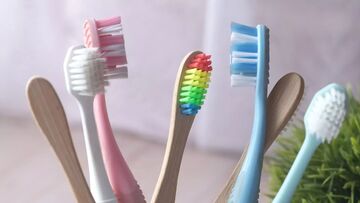Tips to enjoy your ice cream this summer

For many people the summer time means trips to the beach, time in the garden and of course the obligatory ice cream. In this blog we look at ways you can enjoy your ice cream without worrying about sensitive teeth.
Causes of sensitive teeth
Sensitive teeth can vary from a mild twinge to having severe discomfort. Most people will suffer from sensitive teeth at some point in their life and it can start at any time. It is most common in people aged between 20 and 40 and women are more likely to be affected than men.
Our teeth are covered with a strong layer of enamel which protects the softer dentine below. If the enamel becomes damaged or wears away the dentine can become exposed and this can lead the tooth to be sensitive.
Causes of sensitivity include:
Toothbrush abrasion – brushing too hard can cause the enamel to be worn away, exposing the sensitive dentine.
Dental erosion – the acid in our diet can attack teeth over time and cause the enamel to be lost, exposing the sensitive dentine.
Gum Recession – gums may naturally shrink back, exposing the roots of the teeth. Root surfaces do not have a layer of enamel to protect them so can be sensitive.
Gum Disease – a build-up of plaque or tartar can cause the gums to recede and pockets to form around the roots of teeth, exposing sensitive roots
Tooth Grinding – Over time tooth grinding can wear away the enamel making teeth sensitive
A cracked tooth or filling - Any damage to a tooth that exposes the dentine or the roots can lead to sensitivity.
Tooth Whitening – Tooth Whitening can cause sensitivity but it should resolve within 3-4 days of finishing treatment.
You may notice sensitivity when you eat or drink something cold or from cold air catching your teeth. If you have tried treating your sensitive teeth for a few weeks and have no improvements, you should attend your dentist who will be able to find the source of the sensitivity and offer treatment.
Dental Treatments for sensitivity
Prior to any treatment the dentist will perform a full assessment of your teeth and gums to determine the best way of treating any sensitivity. It may be possible to apply fluoride gels, rinses and varnishes to the teeth to help build protection. As well as building teeth up with white, composite fillings to help seal teeth. In serious cases it may be necessary to perform root canal treatment. This removes the nerve from the tooth ensuring you will not feel any sensitivity.
Prior to treatment the dentist may advise that you use a sensitive toothpaste to further help reduce the symptoms. It must be remembered that sensitive toothpaste will not repair sensitivity in the long term, if you stop using a sensitive toothpaste you may find that the sensitivity returns as the effects wear off.
Protect your teeth from sensitivity
Use a soft to medium bristle brush to clean your teeth twice a day using a fluoride toothpaste designed for sensitive teeth.
Change your toothbrush every three months or sooner if the bristles become worn
Don’t brush your teeth straight after eating – some foods and drinks can soften the enamel so leave it an hour before you brush.
Try to only have sugary foods and fizzy and acidic drinks at mealtimes to reduce the number of attacks your teeth must sustain
If you grind your teeth consider wearing a mouth guard to help protect your teeth.
Visit your dental team as often as they recommend
If you would like more help and advice call today on 01702 557766 to book your appointment at Benfleet Dental Centre and let our highly trained team of dentists help improve your sensitive teeth.
Contact us to make an appointment

Related news from the practice

5 Foods That Stain Your Teeth
14/11/2023

Tips on How to Cure Bad Breath
06/11/2023

Mouth Cancer Action Month
04/11/2023

For every toothbrush there is a season
06/10/2023

Visit the practice
Benfleet Dental Centre
8 Benfleet Road, Benfleet. SS7 1QB
Opening times
| Monday | 08:00 - 17:00 |
| Tuesday | 08:00 - 18:30 |
| Wednesday | 08:00 - 17:00 |
| Thursday | 08:00 - 17:00 |
| Friday | 08:00 - 17:00 |
| Saturday | 09:00 - 14:00* |
| *By appointment only |

